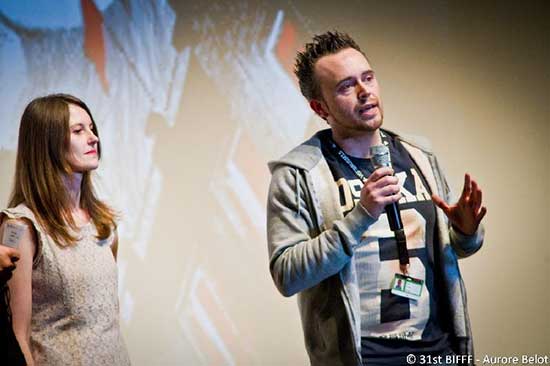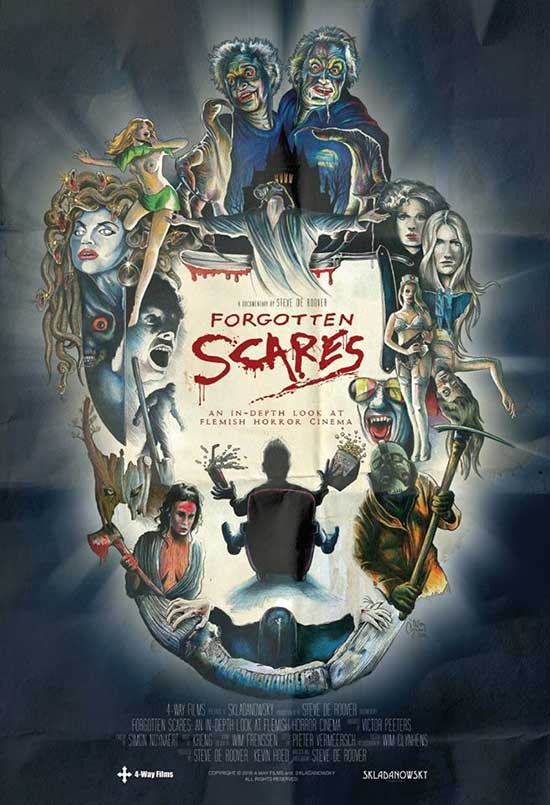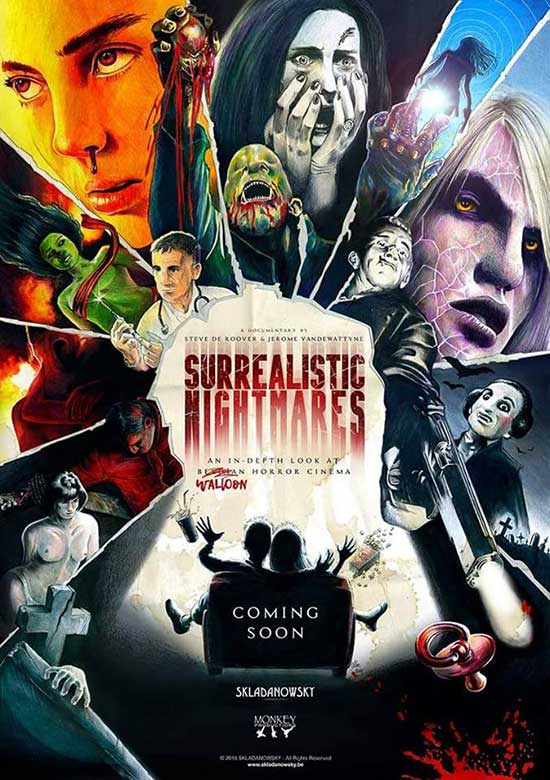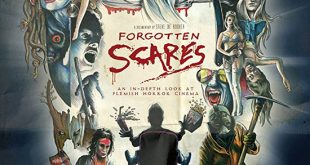I first heard of Steve De Roover back in October, 2017, when I saw he was making a documentary about foreign horror films. If there’s one thing I’m a sucker for, it’s documentaries on horror films. We might live half the world away from each other, but thanks to the internet, I found a way to contact him and wrote him to ask about the doc. Turns out, this Steve guy is a really nice fella, and easy to get along with, probably because he and I share a love for horror films. He ended up sending me a screener of his doc, Forgotten Scares: An In-depth Look at Flemish Horror Cinema, and it instantly became one of my favorite horror docs around. So full of information, film clips, and interviews with people involved in the films. We’ve kept in touch since then, and he’s given me all kinds of info about some upcoming films. Now that his film has an official release approaching (you can pre-order it here through Zeno Pictures, a company I’ve ordered a number of films from and who has always been great to work with), I thought I’d send a few questions over to Steve about his upcoming release and Flemish horror in general. He responded with absolute interview gold:
HNN: First of all, thank you for talking with me. I know you’ve got a lot going on right now, so I really appreciate you taking the time to chat. To start, tell us about you, where you’re from, what you do, all of that good stuff.
Steve De Roover: My pleasure! I am Steve De Roover, a Belgium filmmaker, with a big love for cats, vinyl records, motor bikes, and all things horror. So surprise, surprise, my first two shorts that I directed ended up being in the fantastical genre! The first, Un Homme Bien, a horror tale about a vampire who tries to be a good man but of course fails, and the second, Jacob, a quirky comedy with a girl, a guy, and a statue that comes to life. Things started to move and a couple years ago my partner-in-crime Kevin Hoed and me founded Skladanowsky, an independent production company that made a name by producing ambitious short films like Has#tag, directed by Adil El Arbi and Bilall Fallah (the team that also made Black and Gangsta); the multi-award winning Skai Blue, written and directed by Guido Verelst; and Maw, from the dark, sadistic mind of the talented Jasper Vrancken. I also wrote and directed the feature-length horror documentary, Forgotten Scares: An In-depth Look at Flemish Horror Cinema.
HNN: How did you get into film? What movies did you see and like when you were younger that drew you in, and how did you decide to become an active member of the world of cinema?
De Roover: I always dreamed of making films. As a kid I drew my own posters, I imagined my own stories, I kept a scrapbook of my favourite films. But I never imagined actually ever getting there! In high school, when you are at that crossroad in life where you need to decide what your follow-up studies will be, tragedy happened and I lost my father. I chose to rather go work in a regular job and help out at home, than to chase what probably was a pipe-dream. But still: the fire that is the medium “film” burned, so I got in touch with a couple of magazines and I started to write about films. First this was just film reviews, but later on I also got the chance to report on various film festivals and to do interviews. So I got to know a lot of people in the bizz, one thing led to another, and before I knew it I left home for Amsterdam and worked on two features over there. This got things cooking and I got more and more jobs in Flemish film and television so I got back. Slowly but surely I climbed up the ladder, from an assistant to a location manager and worked on various national and international productions like The Fifth Estate, Emperor, Light Thereafter, The Exception, and The Missing, to name a few. Learning the ropes on set gave me strength to try and make a (short) film myself. Un Homme Bien became quite a festival success for such a small short film, which led to greater things as a producer.
I grew up almost in a video store so the glorious cover art of horror flicks had always a huge attraction to me; films like The Texas Chainsaw Massacre, Halloween, Alien, Friday The 13th, Die Hard, Predator, and the Rambo franchise were my youth.
HNN: Forgotten Scares: An In-depth Look at Flemish Horror Cinema is getting quite a bit of attention right now. What made you decide that this was a story that needed to be told?
De Roover: Thanks! Well, first of all I fell in love with films like Daughters of Darkness and Rabid Grannies, and even more so when I discovered that these were shot in Flanders. It frustrated me more and more that the mainstream press seemed to ignored these past milestones, while most of “our” horror movies got released in many countries across the globe. Another fact was that I almost needed to track these films down, and it was easier to get these on DVD from the USA then to find these in my local video stores. Which is weird, right? So I started to play with the idea to do something around that, and give these pioneers the worthy spotlight that they deserved. Everything got an extra kick in the butt when Jonas Govaerts’ great boy scout-slasher Welp (or Cub as it was released in the States) got released and was sold by the local press as “the very first Flemish horror film.” Bullshit of course, so once and for all I wanted to set the record straight.
HNN: What were some of the greatest challenges you faced when putting together this documentary?
De Roover: The absence of money, haha! But passion and a great crew can bring you quite far. And while some footage was more difficult to obtain in decent quality, I was incredibly charmed and touched by the amazing goodwill of the talent that I interviewed. It was sometimes challenging to get everybody lined up for the interviews with their busy schedules and such, but almost everybody was game.
HNN: What were some of the highlights for you in putting together this film?
De Roover: I knew some of the talent involved from my journalist days, but because of the documentary I got to know them on a different and more personal level, which means a lot to me. A lot of these guys and girls I look up to, so I am very thankful for that. It’s also very touching when you discover that they seem to like the finished film, and some of them even promote it more than I do. It’s a blessing when you feel that they have your back, and that they are grateful for what I tried to achieve with it. It was also a dream come true to sit down and pick the brain of great filmmakers like Harry Kümel. I adore Daughters of Darkness and I hope to see that the renewed interest with Forgotten Scares gets the proposed sequel off the ground. I am also a huge collector of promotional stuff and other memorabilia, and I got to see a lot of unique cool stuff that nobody saw before, and received some very cool film gifts from some of the directors. So to this day Forgotten Scares seems like a gift that keeps on giving. I got to travel the world with it, and experience how different audiences react to and discover “our” horror legacy!
HNN: Forgotten Scares is one of those film documentaries where the viewer ends up writing down a list of films to check out (interviewer’s note: check out my review of the doc here for more details). Are there more Flemish horror films you’d recommend checking out that you weren’t able to fit into the doc, or maybe some that have come out since it was filmed?
De Roover: Thanks, that’s a nice compliment. Well, Tabula Rasa is a must-see!! An amazing fantastical television show, with some great horror influences here and there (Fulci!), directed by Jonas Govaerts (Cub) and Kaat Beels. And there is a lot more stuff coming. After all these years a sequel to Rabid Grannies is going to see the light of day, and I’m quite curious how that will turn out. Also looking forward to Yummie, the first professional Flemish zombie flick, which will be shot next year by the great Lars Damoiseaux, and the feature version of the ghost story The Pond by Jeroen Dumoulein and Michel Sabbe. And, of course, the Skladanowsky short Maw, which is a tense, raw and uncompromising psychological horror film, written and directed by Jasper Vrancken. It premiered at the most recent edition of the Brussels International Fantastical Film Festival and will go to places! Be sure to be on the look out for that one!
HNN: What sets Flemish horror cinema apart from the rest, making it different than, say, American horror? And how are Flemish and Walloon horror cinema different?
De Roover: I disovered in my research that a lot of the films in the beginning tried to mimic American films, for a broader appeal and such, and that we only just a couple of years ago discovered our own identity in cinema. But there are some highlights, of course. Daughters of Darkness has the beautiful city of Ostend as the backdrop for the story, while films like Left Bank and Cub are truly Flemish from beginning to end, and show more of our society, our way of life, good things and bad things, like the political conflict with our Walloon friends as an example. Also, Flemish films can be more explicit with nudity and such than American and even Walloon films. If I really need to compare right now the difference between the two main parts of Belgium and their cinema, then I think that the Flemish output is more eclectic and fun, while the French Belgian horror is surrealistic, with a dash of class.
HNN: Forgotten Scares has been on the festival circuit, and now we’re getting ready for a DVD release. How has the response been to the film? Has the response been about what you expected it would be, or has it surprised you?
De Roover: Yes, and I am so excited! The response has been positive almost across the board. Only a handful of people didn’t seem to get it or completely missed the point, but you never can please ‘em all, so I am a happy camper. It has been screened at a couple of the most important genre festivals around the world: BIFFF, Grossmann, BUT, Razor Reel, Panama, Rojo Sangre and HöFF, to name a few, while also having sold-out special screenings in alternative cinemas, prestigious museums, and even at a medieval castle! I am very thankful, and it still is going, so fingers crossed that the momentum let it spread out for a little while more. The only difficult market seems the English speaking market to be honest, sometimes not even giving it a chance because of the language in combination with the subtitles and so on. Pity that foreign cinema only seems to reach the real film buffs in the States. You guys are missing out! So luckily the DVD and Blu-ray combo can make up for that (haha).
HNN: The DVD release is full of extras and bonus features. Tell us a little about the release itself, and how you decided to go with Zeno Pictures to put this film out there.
De Roover: Right. To me it was important that it would be something special. I am a fan and a collector, and it pains me to see that in a lot of markets physical media is fading away in favor of streaming and of course because of the absolute theft that is downloading. And when something does get released it’s sometimes searching through the looking glass to find anything resembling of extra features. Only a couple of specialty labels like Arrow, Scream Factory, and Vinegar Syndrome make the effort to provide something special with combos and newly recorded special features. And Germany is still the prime example of special collectors packaging, so me and my distributor decided to go for a mix: a DVD/Blu-ray combo, packed in a retro looking mediabook, with a special booklet attached full of international artwork of the key films from the doc. It will also feature alternate artwork, and extras-wise it has my first short on there, deleted segments, a trailer, some candid photos in a flashy photo gallery, and three short documentaries about three Belgian genre films that didn’t make the final cut. We talk about the controversial Blue Belgium of Rob Van Eyck, the underrated and almost impossible to find revenge thriller De Terugtocht by the same director, and last but not least, a sneak peak at French Belgian horror with Vampires. I decided to go with Zeno Pictures because he also distributed some of the Flemish horror films I talk about in Forgotten Scares, and he also believed in my film, so to me it was only logical. He also wants to make a special effort, while other more regular distributors probably just would dump it on a simple DVD, and that is golden! So I hope the film will get picked up by a lot of horror fans. In these times it’s all about supporting the small distributors, independent genre cinema, and the existence of physical media!
HNN: One thing that really stands out is the poster art for the film, kind of a montage of various characters from the films the documentary covers. Tell us about that artwork and who created it.
De Roover: The glorious artwork is illustrated by Wim Clynhens, a great talent with the heart in the right place, a huge fan of genre and who directly got what I wanted to achieve with Forgotten Scares. It’s a throwback to the artwork of the heyday of horror and I hope it attracts the same way as I experienced some of these covers when I was gazing at the walls full of VHS in my videostore. Wim also did the artwork for Maw, Has#tag, Quality Time, and my next feature documentary.
HNN: A few whispers have already begun to circulate about that next feature documentary, Surrealistic Nightmares: An In-depth Look at Walloon Horror Cinema. We even got a sneak peek at the poster art. What can you tell us about this film? Any secrets you want to share this early in the filmmaking process?
De Rover: I cannot say a lot, because it is still quite early in the process of developing. But it will go deeper on the Walloon horror cinema, with prime examples like Calvaire, Amer, Grave, and uber-cult film, Man Bites Dog, being dissected by genre experts and fellow filmmakers, while also going deeper on Belgian issues and trying to mend a bridge between the two languages. I mean, we are one country and are only a tiny spot on the map. Filmmaking is universal and a passion for horror and genre cinema is stronger than the language barrier, right? Or so you would think. But none-the-less, an international hit like Cub didn’t get a French subtitled release in the French side of the country and most French Belgian horror films don’t get properly released in Flanders. Shame! It will also have the creators of the French wave of extreme horror (Martyrs, Inside, and Frontieres, to name a few) give their opinions on the state of Belgian horror. One secret I can share is that Oscar winner Guilermo Del Toro will be featured in the documentary. He is a fan of Belgian horror!
HNN: You’ve done a little of everything when it comes to filmmaking, from writing and directing to producing and acting, as well as playing various other roles on the crew. What is your ultimate goal as a filmmaker? Are you looking to establish yourself in one specific role, or do you hope to keep doing a little of everything?
De Roover: While I do have a couple more stories to tell as a writer/director, my ambition and goal is to produce. To get edgy films on the screen, in a creative working-relationship with more talented directors than me (haha)!
HNN: What projects do you have coming up?
De Roover: Maw just started touring and I am in full swing with the research and development of Surrealistic Nightmares, while we will be shooting two more shorts and another documentary with Skladanowsky this year. If you want to be up-to-date, follow us on www.skladanowsky.be and www.facebook.com/skladanowskyfilm/.
HNN: Thank you so much for this. I’m looking forward to the next doc, and maybe we’ll talk again once it hits the screens. Is there anything you’d like to close with, any last words to finish this conversation up?
De Roover: My absolute pleasure and thanks for the attention. I hope we do in about a year or so! I would say: Keep supporting independent cinema and physical media, without that it will only be superheroes in spandex in cookie-cutter franchises. And who the hell would want that?
 Horror News | HNN Official Site | Horror Movies,Trailers, Reviews
Horror News | HNN Official Site | Horror Movies,Trailers, Reviews



